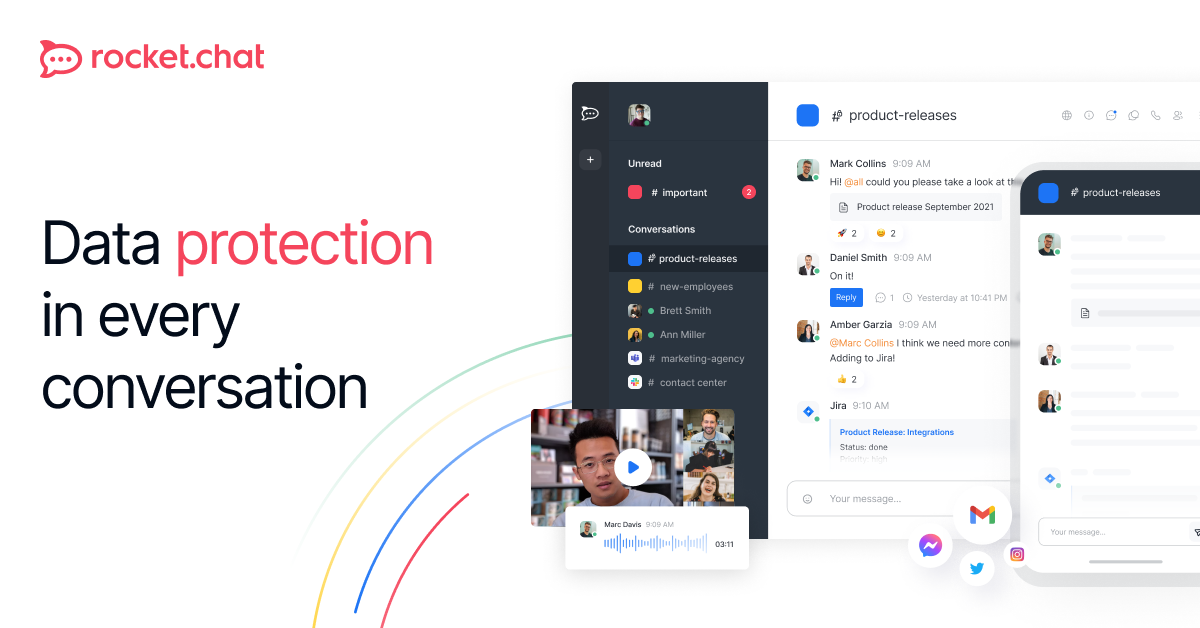Install and setup Rocket.Chat, Talk to colleagues and Customers
MERN based application enabling real-time conversations between colleagues, with other companies or with your customers, regardless of how they connect with you.
Deploy Rocket.Chat Development Server
Table of Contents
- Using Lightsail on Ubuntu 20.04
- Add nginx Reverse Proxy
- Visual Studio Code Connect Using Remote – SSH
- Swap File
- Updating Rocket.Chat Development Instance
- Troubleshooting: Error: gyp failed with exit code: 1

Using Lightsail on Ubuntu 20.04
Normally, 4 GiB instance size should be enough. During both initial and subsequent meteor npm start, 2 GiB instance size is not enough, so it needs at least 4 GiB for meteor npm start. After meteor npm start is successful, usage is 95% of 3.8 G, but can go down into 75%. With 4 GiB, Rocket.Chat frequently crashes the whole server when restarting due to file change, especially when VS Code Remote-SSH is used.
EC2 m6g.medium 4 GiB (ap-southeast-1) + 20 GiB is $37.44 (on-demand pricing). Lightsail 4 GiB is $20, 8 GiB is $40. EC2 r6g.medium 8 GiB (ap-southeast-1) + 20 GiB is $46.78 (on-demand pricing).
The recommendation is to create a temporary 8 GiB Lightsail instance just for initial build, then rsync /home/ubuntu into the normal 4 GiB instance. Although if you want to run code-server or gitpod on it for convenient editing experience, you’ll need more than 4 GiB.
# Update Ubuntusudo apt update && sudo apt full-upgrade -ybyobu-enable
Copy
Reference: https://docs.rocket.chat/guides/developer/quick-start
- Login as
ubuntuuser - Install tools required: (pkg-config etc. is required since 3.8.0 for canvas)
sudo apt install -y g++ build-essential git curl python3-minimal pkg-configsudo apt install -y build-essential libcairo2-dev libpango1.0-dev libjpeg-dev libgif-dev librsvg2-dev- Install meteor:
curl https://install.meteor.com/ | sh- (Under some circumstances, you may need to install a specific (older) release of Meteor instead of the latest, always check the
.meteor/releasefile of the Github code repository to determine if you need to do this before you install meteor) - There is no need to install
nodeornpm, as meteor already includes them. Verify by: meteor node -vmeteor npm -v- Get rocket.chat code from soluvas’s soluvas-3.x branch:
git clone https://github.com/soluvas/Rocket.Chat.git -b soluvas-3.x- (you may want to fork the code on Github first, and then clone your fork)
- This will clone into folder
/home/ubuntu/Rocket.Chat - Install modules
cd Rocket.Chatmeteor npm install- Set environment variables: (save it as
~/setenv.sh— you need tosourceit, not execute it!)
export MONGO_OPLOG_URL="mongodb+srv://xxx.mongodb.net/local?retryWrites=true&w=majority"export MONGO_OPTIONS="{\"ssl\":true}"export MONGO_URL="mongodb+srv://xxx.mongodb.net/soluvas_chat_prod?retryWrites=true&w=majority"export Push_enable_gateway=0export Push_gcm_api_key="AAAA..."export Push_gcm_project_number="420xxx"export ROOT_URL="https://chat.soluvas.com"
Copy
- Start building (the first build can take 10 or more minutes, and you may see various warnings or minor errors — please be patient; subsequent dev builds after the first will be 5 minutes or less)
source ~/setenv.shmeteor npm start
Copy
During testing environment, Lightsail needs to open port 3000.
Add nginx Reverse Proxy
sudo apt -y install nginx
Copy
Create self-signed cert
sudo openssl req -x509 -nodes -days 365 -newkey rsa:2048 -keyout /etc/ssl/private/nginx-selfsigned.key -out /etc/ssl/certs/nginx-selfsigned.crt# set common name as *.soluvas.com
Copy
Edit /etc/nginx/sites-available/chat.soluvas.com.conf
# Upstreamsupstream backend {server 127.0.0.1:3000;}# HTTPS Serverserver {listen 443;server_name chat.soluvas.com;# You can increase the limit if your need to.client_max_body_size 200M;error_log /var/log/nginx/rocketchat.access.log;ssl on;ssl_certificate /etc/ssl/certs/nginx-selfsigned.crt;ssl_certificate_key /etc/ssl/private/nginx-selfsigned.key;ssl_protocols TLSv1 TLSv1.1 TLSv1.2; # don’t use SSLv3 ref: POODLElocation / {proxy_pass http://backend;proxy_http_version 1.1;proxy_set_header Upgrade $http_upgrade;proxy_set_header Connection "upgrade";proxy_set_header Host $http_host;proxy_set_header X-Real-IP $remote_addr;proxy_set_header X-Forwarded-For $proxy_add_x_forwarded_for;proxy_set_header X-Forwarded-Proto https;proxy_set_header X-Nginx-Proxy true;proxy_redirect off;}}
Copy
sudo ln -sv /etc/nginx/sites-available/chat.soluvas.com.conf /etc/nginx/sites-enabled/chat.soluvas.com.confsudo systemctl restart nginx
Copy
In Lightsail, allow firewall on port HTTPS (TCP 443).
Add A record to Lightsail instance IP address, and proxied.
In Cloudflare, set SSL to Full (not strict).
Visual Studio Code Connect Using Remote – SSH
Note: With 4 GiB of RAM and Rocket.Chat running, VS Code Remote-SSH will take some memory on the server and crash it.
To enable VSCode to watch files, please apply the following system tweak to the server.
Meteor also recommends this: https://github.com/meteor/docs/blob/master/long-form/file-change-watcher-efficiency.md
Troubleshooting: UnhandledPromiseRejectionWarning: Error: ENOSPC: System limit for number of file watchers reached
Solution:
| 1 | echo fs.inotify.max_user_watches=524288 | sudo tee -a /etc/sysctl.conf && sudo sysctl -p |
Swap File
Perhaps adding 1 GiB swap to 4 GiB VM may make it more resilient to out-of-memory crashes?
Reference: https://aws.amazon.com/premiumsupport/knowledge-center/ec2-memory-swap-file/
sudo dd if=/dev/zero of=/swapfile bs=128M count=8sudo chmod 600 /swapfilesudo mkswap /swapfilesudo swapon /swapfilesudo swapon -s
Copy
6. Enable the swap file at boot time by editing the /etc/fstab file.
Open the file in the editor:
| 1 | $ sudo vi /etc/fstab |
Add the following new line at the end of the file, save the file, and then exit:
| 1 | /swapfile swap swap defaults 0 0 |
Updating Rocket.Chat Development Instance
Update Ubuntu:
sudo apt update && sudo apt -y full-upgrade
Copy
Stop meteor npm start first, otherwise it will reload and crash Ubuntu due to insufficient memory.
Update Meteor:
meteor update
Copy
Merge stable tag:
git pullgit fetch RocketChat# get commit ID from GitHub tag pagegit merge COMMITgit commit
Copy
Install dependencies:
meteor npm start
Copy
In the previous step, make sure there are no errors.
Source environment variables configuration then start Rocket.Chat:
source ~/setenv.shmeteor npm start
Copy
Troubleshooting: Error: gyp failed with exit code: 1
Install canvas development dependencies.
Try:
rm -rf ~/.node-gyprm -rf node_modules
Copy
Then try again.
Troubleshooting:
../src/Canvas.cc:542:85: error: no matching function for call to ‘v8::Value::ToObject()’
542 | Context2d *context2d = Nan::ObjectWrap::Unwrap(context->ToObject());
Reference: https://github.com/Automattic/node-canvas/issues/1490
Gopal Jani
https://www.linkedin.com/in/gopal-jani/






No comments yet. Login to start a new discussion Start a new discussion